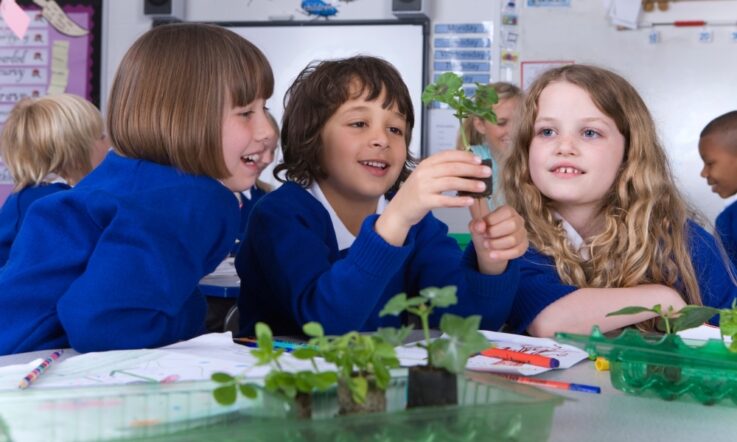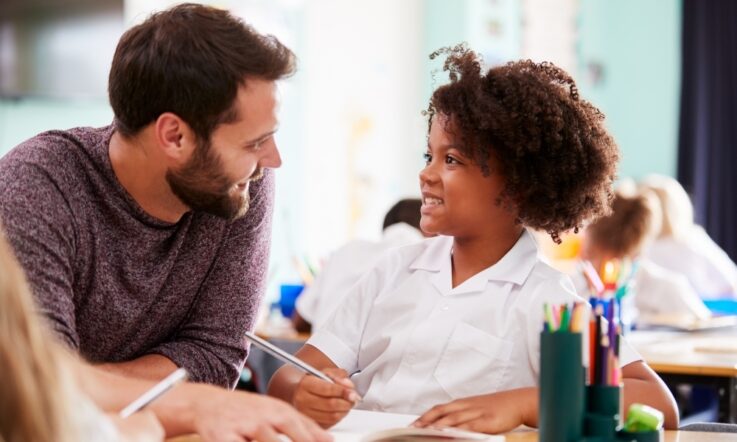This podcast from Teacher magazine is supported by The Australian Volunteers Program. The Australian Volunteers Program is looking for teachers to support communities overseas. Become a remote volunteer and support positive change in developing countries. There are education assignments now online. Visit australianvolunteers.com to find the right assignment for you.
Thanks for tuning in to this episode of Teacher Staffroom, where we catch you up on the latest evidence, insight, and action. I'm Dominique Russell.
With ACER’s Research Conference 2021 fast approaching, at Teacher magazine, we’ve been catching up with some of the keynote speakers that are on the line-up for the five-day online conference. The theme is: ‘Excellent progress for every student: What will it take?’ and, at the time of publishing this episode, you can still secure your registration. The conference kicks off on the 16th of August.
In today’s episode I’m going to get you up to speed on these exciting stories at Teacher, and also some more of my highlights. And, like all episodes of Teacher Staffroom, I’ll be posing some questions throughout the podcast, so feel free to pause the audio as you go, gather some colleagues and discuss together how these stories could be relevant to your school context. Let's jump in.
A definite podcast highlight for us recently has been the conversation between Professor Rich Lehrer and our deputy editor, Rebecca Vukovic. He presented some fascinating insights on the work he’s doing on mathematical and scientific reasoning in the classroom, which focuses on the design of learning environments and involves collaboration with teachers in local schools. Here’s a snippet from the episode where he explains what this research involves:
The essential question for me is ‘is it possible to think about re-envisioning mathematics and science education for children in ways that put them into contact with some of the ways in which people in these disciplines tend to generate and revise knowledge?’ Of course they’re not going to be like copies of mathematicians or scientists, but rather, can we engage them in fruitful kinds of approximations to how people in those disciplines think?
And I was also very interested in alternative routes to a mathematics education, centred in space and geometry and data, because these of course are very useful as you think about modelling in sciences and how to get a grip on natural systems often involve generating quantities and thinking about quantitative relationships. So what might be ‘children-versions’ of that enterprise?
So, there are lots of really interesting questions to unpack there. Rich Lehrer will be delving into the topic in a lot more detail in his keynote address, titled Accountable Assessment at the Research Conference.
Another really fascinating discussion we had with a Research Conference presenter was my interview with Professor Dianne Siemon on her upcoming keynote address, titled, ‘Excellent progress for all: A function of year level curriculum or evidence-based learning progressions?’
She shared that she hopes that conference attendees come to a deeper understanding of what’s involved in developing evidence-based learning progressions for key aspects of school mathematics and how these can be used to identify student learning needs. Although, it was this point that Dianne made here that stood out most to me:
Insisting that all students irrespective of where they are in their particular learning journey should master all aspects of the mathematics curriculum at their year level is a recipe for disaster. Having said that, I am firmly of the view that all students have the right to be exposed to the curriculum at their year level, but this needs to be done in ways (e.g., accessible but challenging tasks in mixed ability settings), and in contexts (e.g., a culture that supports growth mindsets) that provide opportunities for all students to learn, if not immediately, then ‘down the track’.
It was a really important point from Dianne there that I think you’ll all enjoy reflecting about.
Now, changing gears to some other highlights from stories we’ve brought to you recently. At Teacher, I’m sure you know we welcome contributions in the form of articles and videos from our readers. Recently, we’ve heard from educators at two schools on how they’re prioritising wellbeing with their students.
One of these contributions I’d like to highlight with you is a reader submission from Liam Casson, who is the Director of the Wynne Centre for Boy’s Health and Wellbeing at Christ Church Grammar School in Perth, Western Australia.
Here’s what Liam had to say in his article:
In the early stages of our wellbeing journey, it was important to establish and prioritise what The Wynne Centre was working towards. After careful consideration and deep exploration into the evolving field of wellbeing science, as a school, we now define wellbeing as the combination of feeling good and functioning, while striving to make a positive difference to the world around us.
In the article, Liam goes on to describe their school’s journey of implementing various wellbeing programs and their commitment to continually collecting data to constantly improve their wellbeing initiatives. So, that point there brings me to a question for you to think about.
Do you have a whole school approach to managing and supporting student wellbeing? If so, how often do you revisit this approach to assess its effectiveness and its relevance?
We also heard from Dr Martin Hughes, Head of Research and Development at Skillset Senior College, which is a school in New South Wales for senior secondary school students who are experiencing barriers to schooling. He’s recently started an action research project at the school, which has the aim of assessing the impact of three specific activities that were shown to have a positive impact on student mental health—exercise, resilience training, and occupational therapy. While the study is still ongoing due to some COVID-19 related delays, Martin had this to say on some of their initial findings:
In our preliminary findings, we saw female students report higher levels of depression and anxiety compared to male students. Whereas, male students reported higher levels of wellbeing than female students. In a single term, there was an overall decrease of approximately 10 per cent in depression and anxiety scores in each group (exercise, resilience training, and occupational therapy).
After resuming the study in February this year, we have found similar results and aim to publish our full findings in 2022. Although we are yet to conclude our project, what this study has shown so far is, when we prioritise wellbeing everything else in our lives will improve.
And finally, I’d like to share with you up to speed with a few new research papers that have been published recently. The first is a journal article from the Improving Schools journal, which analysed the sources of stress for teachers working in different school sectors. The researchers’ analysis found state and private school teachers actually identify different areas as contributors towards their work-related stress. Here’s what they told us:
Private school participants emphasised parents as a source of stressful accountability, whereas the state school teachers typically emphasised burdensome workloads compounded by accountability-motivated school policies as their [primary] stressor … Some teachers in the state sector described their work as intensely stressful, whereas the private school teachers typically described milder experiences of stress. The private school participants also indicated that they felt well-resourced to meet the demands of their work by long holidays and appropriate levels of autonomy.
So, here’s something to reflect on, on that topic. How often do you make time to focus on your own wellbeing and reduce stress? What strategies do you use to cope with the pressures of your role? Does your school have a wellbeing policy for staff, as well as students?
Now, one last highlight for me was a paper that investigated student perspectives on what makes a teacher a good listener. It detailed a really interesting study that was conducted in the United States that involved a group of students who were gifted in reading.
The researchers chose to focus on these students in particular, because the study was qualitative, so they thought students with high verbal and comprehension capabilities would be most suitable. The study found that teachers are perceived by students as being good listeners when they embody elements of both verbal and nonverbal active listening skills.
Specifically, verbal skills like responding with feedback, adding on to students’ responses, and asking follow-up questions were appreciated by students in classroom discussions, as were nonverbal actions like eye contact, head nodding, body language, facial expressions, and also listening without interruption.
So, here’s one final question to think about following those study findings. Have a think about a recent classroom discussion you led. Which verbal and nonverbal actions from that list did you utilise? Which did you not utilise? Is there room for you to implement new actions in an upcoming lesson?
That’s all for this episode. Thanks for listening. You can find links to all the pieces I mentioned in the transcript of this podcast at www.teachermagazine.com.
You’ve been listening to a podcast from Teacher magazine supported by the Australian Volunteers Program. Visit australianvolunteers.com for more information on becoming a remote volunteer.



